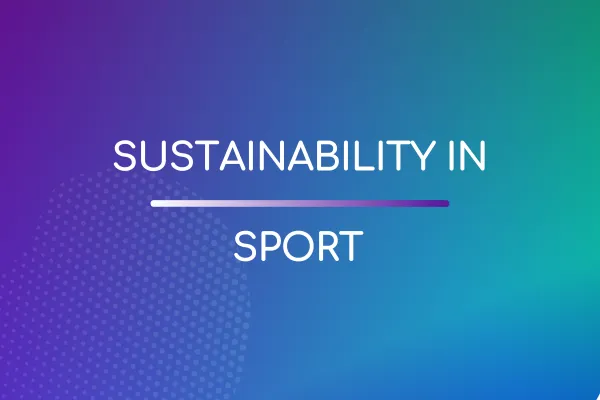Read Our Latest Blogs
Welcome to our blog where we embark on a journey to explore the transformative potential of sustainability for small and medium-sized businesses (SMBs). In the wake of climate change, resource depletion, and a heightened awareness of our environmental impact, SMBs stand at the forefront of redefining success by placing equal importance on profitability and planet-friendly practices.

How Sustainability Is Shaping The Future Of Sports
As climate action accelerates, sports organisations are embracing sustainability to stay competitive and relevant. With increasing pressure from governments, sponsors, and fans for measurable climate initiatives, sustainability has become both a necessity and an opportunity. Early adopters have not only gained a competitive edge but also positioned themselves as industry leaders in shaping the future of sustainable sports.
The Growing Importance of Sustainability for Sports Organisations
Sustainability is fast becoming a strategic priority for Australian sports organisations as climate risks and stakeholder expectations increase. While Europe is leading with regulatory mandates like the Corporate Sustainability Reporting Directive (CSRD), Australia is not far behind, with the introduction of mandatory climate and ESG reporting for large organisations on 1st January, 2025. This means major sporting bodies, leagues, and venues have to measure, manage, and disclose their environmental impacts including carbon emissions from events, travel, infrastructure, and supply chains.
Importantly, these expectations are not limited to elite-level organisations. Small and community-based sporting organisations are also under growing pressure from local councils, sponsors, and members to operate more sustainably. Many councils now require environmental management practices as part of funding or facility use agreements, while sponsors increasingly prefer to support clubs that align with their sustainability values. From reducing waste at matches to improving energy efficiency at clubrooms and promoting low-carbon transport options, local clubs have a vital role to play.
The Sustainability Momentum from Olympic Games
The Paris 2024 Olympics set a new benchmark for integrating sustainability into large-scale events. One of its most notable achievements was in carbon accounting, where advanced reporting systems effectively measured and offset emissions. The event also prioritised sustainable infrastructure, with 95% of venues being pre-existing or temporary, significantly reducing construction waste. Additionally, the games were powered entirely by renewable energy, further minimising their environmental impact. Fan participation played a key role with spectators encouraged to use public transport, reducing their collective carbon footprint.
These efforts led to a 50% reduction in carbon emissions compared to previous Olympic Games, proving that sustainability is not just an ideal but an essential and achievable goal for the future of sports.
In preparation for the 2032 Brisbane Olympics, Sport Australia is integrating sustainability into its long-term strategy, with an emphasis on reducing the carbon footprint of the Games. This includes plans for green infrastructure, renewable energy integration, and sustainable waste management practices to ensure that the Games leave a lasting positive environmental legacy..
The Growing Responsibility for Sports to Address Environmental Impact
Sports organisations have a growing responsibility to track and mitigate their environmental impact as climate concerns rise. With high emissions from travel, stadium operations, and merchandise, sustainability is essential.
Local climate leaders are already paving the way. Sport Environment Alliance (SEA) is a key advocate for environmentally responsible sport in Australia, supporting clubs and organisations to adopt sustainable practices and reduce their carbon footprint. The Australian Sports Commission is also promoting greener sport through funding and resources that encourage climate-aware planning and operations.
At the community level, clubs like Surfing Victoria have led initiatives to reduce plastic waste at events, and Football Victoria has encouraged clubs to embrace active transport and energy efficiency. These organisations not only promote healthier, more active lifestyles but also help protect the natural environments that sport relies on — from coastlines and trails to parks and playing fields.
United Nations (UN) Sports for Climate Action
On the global front, the UN Sports for Climate Action initiative offers a framework for sports organisations to drive meaningful environmental change. It encourages organisations to commit to achieving net-zero carbon emissions by 2050, alongside the obligation to measure and report their carbon footprints accurately. Co-launched by United Nations Framework Convention on Climate Change (UNFCCC) and the IOC, it guides organisations to implement strategies aimed at reducing environmental impacts across operations and events.
Success Stories: Sports Organisations Leading the Way
Australian sports organisations are making significant strides in sustainability, setting strong examples of how sport can help address climate change. Tennis Australia has been a frontrunner in implementing sustainable practices, particularly during the Australian Open, where it has introduced energy-efficient measures, waste reduction programs, and water conservation initiatives. These efforts reflect a growing commitment within the Australian sports sector to reduce environmental impact in line with global sustainability goals.
Similarly, Netball Australia is leading the way by focusing on sustainable travel options, minimising energy use at events, and promoting active transport. This is part of a broader trend across Australian sport to address key environmental areas, such as water usage, waste management, and emissions, ahead of the global spotlight on sustainability in 2032.
Football South Australia has collaborated with local councils to implement sustainable infrastructure improvements at community clubs. One initiative includes the installation of solar panels and LED lighting at clubs across Adelaide, significantly reducing energy costs and carbon emissions. These projects not only promote environmental stewardship but also make operations more cost-effective in the long term.
Benefits of Sustainability in Sports
Cost Savings and Operational Efficiency
Implementing sustainability starts with understanding your environmental impact. Carbon accounting goes beyond environmental stewardship; it also drives significant cost savings by optimising stadium energy use, reducing merchandise supply chain expenses and minimising waste disposal fees.
Enhanced Reputation and Positive Impact
Fans and sponsors are increasingly drawn to environmentally responsible organisations, valuing those that actively measure and reduce their carbon footprint. This not only strengthens brand loyalty but also attracts eco-conscious partners.
Beyond operational benefits, sustainability efforts inspire fans to adopt greener lifestyles, amplifying the organisation’s positive impact and reinforcing its role as a leader in promoting environmental responsibility within sports.
Regulatory Compliance and Risk Mitigation
As sustainability expectations grow, sports organisations across Australia are increasingly being asked to measure, reduce, and offset their carbon emissions. In line with global trends, including the 2032 Brisbane Olympics, Australian sports bodies, including smaller clubs and community organisations, will need to meet stricter sustainability standards.
By adopting carbon accounting practices, even small organisations can stay ahead of these evolving regulations, manage environmental risks, and boost their reputation as climate-conscious leaders. This approach not only helps mitigate potential future costs but also builds organisational resilience and supports long-term sustainability, ensuring that clubs remain viable and credible in an increasingly eco-aware community.
Challenges in Achieving Sustainability for Sports Organisations
While the benefits of sustainability are clear, implementing these practices presents several challenges for sports organisations.
Resource constraints
Resource constraints can be a significant barrier, especially for smaller organisations that may lack the funding or expertise required for robust carbon accounting systems. Additionally, financial limitations can hinder sustainability initiatives, as implementing eco-friendly solutions often requires upfront investment. From upgrading facilities with renewable energy to integrating sustainable supply chains, the costs can be prohibitive.
Data Collection
Complex data collection poses difficulties as measuring emissions across diverse operations, ranging from energy use to transportation, can be daunting and time-consuming.
Knowledge gaps
There are also knowledge gaps, with many organisations unfamiliar with carbon accounting standards or effective strategies for reducing their environmental impact.
A carbon accounting software partner can help by automating accurate emissions tracking, identifying reduction opportunities, ensuring regulatory compliance, and enhancing transparency for fans, sponsors, and other stakeholders.
How Evalue8 helps you take control of your sustainability journey
Leveraging a powerful reporting tool enables sports bodies to streamline sustainability reporting, align with global standards like GHG Protocol and SBTi, and support verified carbon offset projects for long-term impact. With data-driven insights and forecasting, sports organisations can effectively meet sustainability goals, reduce emissions, and strengthen their leadership in climate action.
Evalue8 Sustainability Pty Ltd (Evalue8) is a specialist software company that provides a sustainability platform for organisations to effortlessly navigate the complexities of environmental accountability and accelerate their sustainability journey with automated carbon accounting.
Our software helps small and medium organisations track their emissions over time and generate clear reporting so stakeholders can easily understand your organisation’s sustainability performance, fostering trust and credibility.
We help organisations develop an emissions reduction plan by providing data driven insights that identify opportunities for potential savings, operational efficiency and continuous improvement.
If you’re looking for software to help you measure, report and reduce your emissions with the guidance of carbon experts, schedule a demo with us today.
Conclusion
Sports organisations have a unique ability to inspire change, both on and off the field. In a world where sustainability is a competitive advantage, leveraging technology-driven climate action not only reduces operational costs but also enhances brand reputation and long-term success.

